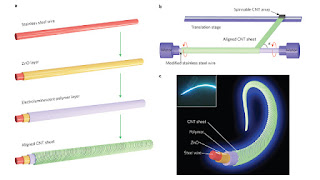Flexible
polymer threads For clothing Application
Forms on the catwalk could soon turn into a ton funkier with
the improvement of new light-emanating strings that can be sewn or woven into
materials. Aside from the possibility of a petticoat that can show lit up
pictures, the innovation could discover applications in drug, its innovators
say, with keen garments that could be connected to indicative gadgets,
permitting data about the wearer's medicinal condition to be unmistakably
imparted to the wearer or a well being proficient.
Huisheng Peng of Fudan University in Shanghai, and partners
made a fiber of a polymer light-transmitting electro chemical cell (PLEC) by
taking a stainless-steel wire and plunge covering it with a thin layer of zinc
oxide nanoparticles. They next plunge covered the adjusted wire with an electroluminscent
polymer layer comprising of a mix of
a blue light emanating polymer (PF-B), ethoxylated trimethylopropane
triacrylate (ETT-15) and lithium trifluoromethane sulfonate (LiTf). At last,
the polymer-covered wire was wrapped in a layer of adjusted carbon nanotubes.
This was accomplished by gradually pivoting the wire with engine and winding a
spinnable carbon nanotube cluster around it.
At the point when a voltage is connected – the steel wire centre
goes about as the anode and the carbon nanotube sheet as the cathode – the
polymer emanates light. The analysts could create strands that were a few centimetres
in length. They wove various such filaments into a texture test to show the
strands' adaptability and quality. 'We joined around six filaments into an
example of texture a few centimetres square,' says colleague Zhitao Zhang. The fibre-formed PLEC is
adaptable, and its splendour was kept up at over 90% of its most extreme in the
wake of twisting with a span of bend of 6mm for 100 cycles.' The shade of the
show can be controlled by utilizing a scope of strands that each discharge an
alternate shading.
Linkhttps://www.chemistryworld.com/news/flexible-polymer-threads-set-to-light-up-clothing/8384.article




Comments
Post a Comment